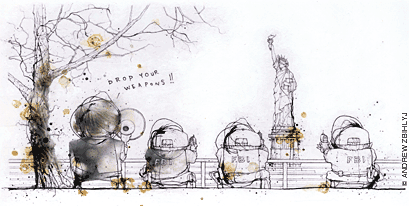
Conference | Like an MTV music video, it was set to a toe-tapping beat, but that is where the similarity ended: Mixed with news clips of the U.S. occupation of Iraq, performers with covered faces chanted: “We’re gonna take you over like we took over the Shah … Like we destroyed the Two Tow-ahs—ha ha.”
Daniel Sutherland, officer for civil rights and civil liberties at the U.S. Department of Homeland Security, identified the clip he had just shown as a recruiting video for a group in Britain that claims to be linked with al-Qaeda.
In graphic terms it represented the dual challenge of protecting civil liberties and national security after September 11—a topic examined at a conference hosted in June by the Law School, Penn’s Institute for Strategic Threat Analysis and Response, and the United States Army War College.
“There are bad people out there,” said Sutherland. “They are planning right now a way to kill you and your family and your children and your neighbors.” But, he conceded, “The terrorists who attacked us attacked us because they despise our way of life, our freedom of speech, our freedom of worship, our freedom of the press, our freedom of privacy. If we allow civil liberties to be significantly compromised, we’ll be compromising what this war [against terrorism is] all about.”
Though all of the conference participants spoke of the importance of preserving constitutional rights while fighting terrorism, the scholars and experts had different ideas of how to best protect them and gave varied assessments of the track record of the Bush administration.
Dr. David Rudovsky, senior fellow at Penn Law, acknowledged the severe threats posed by terrorism, but warned that, “War and the perceived dangers to national security put great pressure on civil liberties and human rights.”
Citing examples such as the internment of Japanese-Americans during World War II based solely on their ethnicity, he said some of the actions taken since September 11 share characteristics with “what we’ve done wrong before.”
For example, in the months following the terrorist attacks, between 1,200 and 2,000 people were detained on alleged visa violations under the claim that they posed a terrorist threat to the United States, he said. They were denied access to counsel and, in some cases, were held in solitary confinement. “It turns out that we now know two years later that the only common characteristic of the detainees was not terrorism but their ethnic identities,” Rudovsky said. They were all of Arab or South Asian descent. “I don’t expect the government to bat a thousand. I don’t expect the government to bat five hundred. The government in that situation batted zero.”
Rudovsky spoke of the sweeping powers claimed for the nation’s chief executive, including the power to declare American citizens as “enemy combatants” and hold them without charge indefinitely in military prisons. In investigating and prosecuting terror, Rudovsky said, “We have created a system of detention and punishment—a parallel system to the criminal justice system without the basic safeguards of due process of law.” (About a week after the conference, the U.S. Supreme Court ruled that foreign citizens imprisoned at Guantanamo Bay as well as Americans held in military prisons are entitled to judicial hearings.)
Rudovsky warned that civil liberties are not only at risk in terrorist cases. “Inevitably there will be a shift. If we give the government unrestrained powers in one area, those will tend to flow into other areas as well.”
M.E. “Spike” Bowman, senior counsel for national-security law at the FBI, argued that the U.S. government lacks the investigative capabilities it had, “relatively speaking,” 20 years ago. Technology must be harnessed to keep up with cell phones, PDAs, email, and electronic bulletin boards—as well as the rise in international travel, he said. “There is too much information in the world today for the human mind to assimilate it and make sense of it.”
That is not to say that we shouldn’t be wary of the technologies that are developing to meet this challenge, he said. Through data mining, for example, the government scans computer records and data files for information that might lead to the identification of terrorists. “I don’t think we’ve taken the opportunity to use that technology to also protect the privacy of individuals whose information may be swept up in data mining,” Bowman said.
The Patriot Act, adopted overwhelmingly by Congress in the wake of the September 11 attacks, came under scrutiny at the conference. Marc Rotenberg, executive director of the Electronic Privacy Information Center, criticized the secrecy with which the act has been carried out, making it difficult to debate whether or not its various provisions should be renewed.—S.F.



